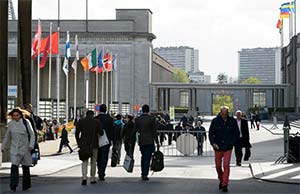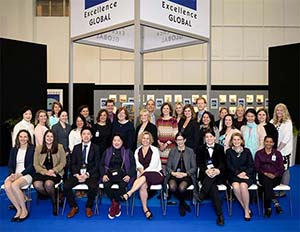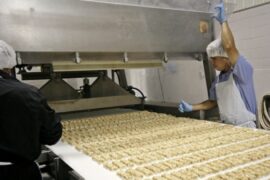By John Saulnier, Editorial Director
They came, they saw, they bought and sold seafood, they conquered!
This collectively sums up those attending the Seafood Expo Global/Seafood Processing Global event in Brussels, which concluded on April 28, about a month after terrorist bombings attributed to the Islamic State in Iraq and Syria (ISIS) killed 35 persons and wounded more than 300 at Zaventem International Airport and within the Brussels metro underground station at Maelbeek.
 About a month after terrorist attacks in Belgium’s capital city and the de facto political center of Europe, buyers and sellers of fishery products stream into the Brussels Expo fairgrounds to conduct business, though perhaps not quite as usual.Most people in the fish business are a hardy breed of can-do optimists who regularly deal head-on with adversity and are not easily intimidated. This certainly applies as well to the folks at Diversified Communications, who have annually hosted the world’s largest seafood trade fair in Belgium’s capital city, which is also the political center of the European Union. Having done so successfully for 24 years without interruption, they assessed the situation carefully in the wake of the attacks and decided that the show must go on – safely.
About a month after terrorist attacks in Belgium’s capital city and the de facto political center of Europe, buyers and sellers of fishery products stream into the Brussels Expo fairgrounds to conduct business, though perhaps not quite as usual.Most people in the fish business are a hardy breed of can-do optimists who regularly deal head-on with adversity and are not easily intimidated. This certainly applies as well to the folks at Diversified Communications, who have annually hosted the world’s largest seafood trade fair in Belgium’s capital city, which is also the political center of the European Union. Having done so successfully for 24 years without interruption, they assessed the situation carefully in the wake of the attacks and decided that the show must go on – safely.
“We made the decision to go ahead” after consulting with Brussels officials, security personnel and exhibitors, said Mary Larkin, executive vice president of the Portland, Maine, USA-headquartered producer of international exhibitions, conferences and other events.
Heightened security measures ranging from metal detection and bag checks upon entry to the fairgrounds, to on- and off-site police and military presence and the deployment of trained sniffer dogs, were put into place to assure show-goers that all steps were taken to maximize safety inside and outside of the sprawling, multi-hall Brussels Expo complex. In addition, buses were chartered to ferry visitors and exhibitors to and from the show from numerous downtown locations near hotels as well as the airport and train stations.
Preferring to see the glass as 95% full rather than slightly empty, Larkin said that the cancellation rate among pre-booked exhibitors was only 5% – both in terms of numbers of companies and space occupied.
“Stands are busy, people are connecting, new products are being launched and the expo has the usual air of excitement,” she was pleased to report on day one of the expo.
Liz Plizga, Diversified’s vice president of seafood expositions, said that 1,664 companies bought space amounting to 35,682 square meters across seven halls and the patio.
“In the last weeks leading up to the opening there was significant registration, including commitments from key buyers and large seafood groups. Before the March 22 event [terrorist attacks] we were tracking to have a banner year,” stated Plizga, who added that the expectation is that the 2016 running will likely be on a par with last year’s performance.
What has yet to be revealed is the attendance count, which typically is not made available until all statistics are analyzed and verified by accountants some time after the show closes. Judging by comments made to FrozenFoodsBiz.com by exhibitors and visitors alike, the number will be down in comparison with the previous year’s total, which set a record at over 26,000. But this may not necessarily have been a bad thing for each segment of the visitor mix, especially given the extraordinary circumstances preceding the opening of the fair.
“I found the traffic slower this year, obviously due to what happened last month. But the fact that the aisles were not swamped meant that the show was easier to maneuver for a buyer like myself, which made the overall experience more effective,” said Nuno Fernandes of Bronx, New York-based Austin Meat & Seafood Co.
In Solidarity Against Terrorism
As business went on, if not as usual, gestures of solidarity and expressions of sympathy for the grieving people of Belgium and beyond were offered by show-goers of all political stripes and religious persuasions.
A moment of silence during the Indian Seafood luncheon held on the second day of the show was invoked by Leena Nair, chairman of India’s Marine Products Export Development Authority (MPEDA). It followed heartfelt remarks she made in remembrance of the lives lost and injuries suffered during the terror attacks.
Among the fatalities was a son of India, Raghavendran Ganeshan. The 31-year-old employee of Bangalore, Karnataka-headquartered IT firm Infosys was traveling in the same railcar as the murderous suicide bomber who triggered the deadly explosion at the Maelbeek station.
In a visit to Brussels within a week of the carnage, Indian Prime Minister Narendra Modi offered condolences and paid homage to the slaughtered innocents from 16 different countries trapped in harm’s way on that fateful day. “Terrorism is not a challenge to any one nation, but it is a challenge to all humanity,” he stated. “The entire world must unite to combat terrorism.”
The prime minister pointed out that, sadly, 90 countries around the world have been victimized by terrorist incidents during the past year, and thousands of people have perished as a result of the atrocities.
 Hats off to the staff members of Diversified Communications! The team worked long and hard in the midst of adversity following the March 22 terrorist attacks in Brussels to assure that Seafood Expo Global/Seafood Processing Global would be a safe and successful event for exhibitors and visitors.Sad indeed is man’s inhumanity to man. Since the Brussels attacks, the list of assaults by so-called ISIS members and affiliates, as well as related sectarian-stoked violence, has lengthened on an almost a daily basis. Among countries currently bearing much of the brunt of the bloody onslaught are Iraq, Syria, Yemen, Afghanistan and Turkey. Many others are also feeling the pain of insane barbarism.
Hats off to the staff members of Diversified Communications! The team worked long and hard in the midst of adversity following the March 22 terrorist attacks in Brussels to assure that Seafood Expo Global/Seafood Processing Global would be a safe and successful event for exhibitors and visitors.Sad indeed is man’s inhumanity to man. Since the Brussels attacks, the list of assaults by so-called ISIS members and affiliates, as well as related sectarian-stoked violence, has lengthened on an almost a daily basis. Among countries currently bearing much of the brunt of the bloody onslaught are Iraq, Syria, Yemen, Afghanistan and Turkey. Many others are also feeling the pain of insane barbarism.
Meanwhile, as the world turns the optimists among us are hoping and praying that the march of civilization is bound to prevail over the evil of terrorism. To quote Chilean poet-diplomat Pablo Nédura, as the Brussels Expo team did almost immediately after the senseless attacks in Belgium: “You can crush the flowers, but you can’t stop the spring.”




